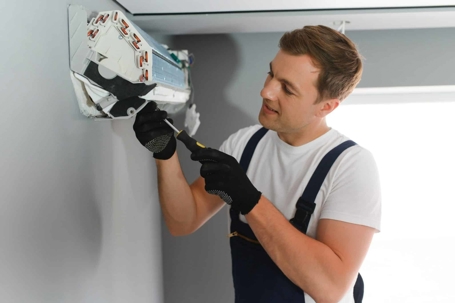Air conditioning (AC) and air quality are directly related. Believe it or not, air quality can also affect the functioning of your AC. Since we spend about 90% of our time indoors, air quality is important to consider. Research has demonstrated that air within homes can be more polluted than in industrialized cities. As a result, indoor contaminants can contribute to potential health issues.
Thankfully, there are ways to prevent this. First, it’s necessary to understand the relationship between your AC and indoor air quality. So, our experienced HVAC professionals at Fairway Heating & Cooling in Tampa Bay, Florida, will provide you with advanced knowledge regarding this topic.

Primary Causes of Poor Indoor Air Quality
Indoor air quality can be compromised due to any residual contaminants. Having inadequate ventilation and dirty AC filtration systems can only exacerbate the buildup of pollutants. In return, this can also affect the efficiency of your AC. For example, a dirty air filter can distribute dirt and debris throughout your home, which limits its cooling efficiency.
Some common pollutant sources include:
- Fuel-burning combustion appliances
- Tobacco products
- Excess moisture
- Household cleaning products
- Mold
- Pesticides
- Dirt and dust
- Outdoor air pollution
- Bacteria and viruses
- Pet dander
- Contaminated HVAC systems
If you recognize any contaminants in your home, it’s a sign that you must address any HVAC system issues. So, it’s best to consult an HVAC expert when uncertain about how to improve indoor air quality.
How AC Enhances Indoor Air Quality
HVAC systems are designed to provide the ideal temperature through heating and cooling, increase air circulation, and reduce humidity. This system requires ventilation and filtration, which can mitigate air pollutants. When these systems function optimally, they reduce the amount of contaminated particles in the air.
Prioritizing Air Filtration and Ventilation with HVAC
If you want to reduce the risk of pollutants in your home, it’s critical to have properly functioning filtration and ventilation systems for your AC unit.
The Department of Energy suggests that improving ventilation and filtration controls is critical to reducing risk factors for airborne disease transmission and improving health benefits. Specifically, ventilation allows the indoor movement of indoor air particles. Mechanical ventilation is accomplished through HVAC mechanical ventilation (i.e., circulating air using ducts and fans), while natural ventilation relies on distributing air flow naturally (i.e., windows). Therefore, ensuring that you have adequate ventilation installed makes a big difference.
Along with ventilation, filters are essential to maintaining your AC’s health and good indoor air quality. Air filters act as a barrier, filtering out dust, debris, and pollutants from your home. They also protect your unit from reduced airflow and quality, frozen evaporator coils, decreased cooling efficiency, and high energy bills.
By changing your air filters frequently, you can prevent these problems from occurring. In addition, scheduling regular maintenance with an HVAC professional helps eliminate air quality issues early on, before they become detrimental to your health.
Why Choose Fairway Heating & Cooling?
If you choose Fairway Heating & Cooling in Tampa Bay, Florida, our experts can evaluate your AC and indoor air quality and make any necessary upgrades. More so, we can perform inspections to test your home’s air quality to ensure that no harmful contaminants are present. With over 30 years of experience, we can handle all of your HVAC needs at a reasonable cost. We also specialize in:
- AC repair
- Maintenance
- Installation
- Duct sealing
- Duct repair
- Mold removal
Regardless of your AC concern, we can diagnose and resolve any issues efficiently. Please contact us now to schedule an appointment with a customer service representative or to receive a work quote!
The post The Relationship Between Your AC and Indoor Air Quality appeared first on Fairway Heating and Cooling, LLC.

